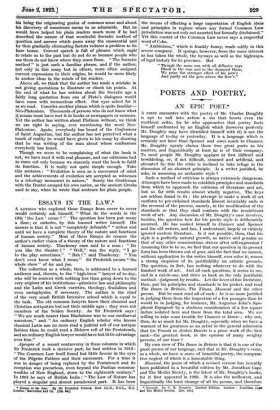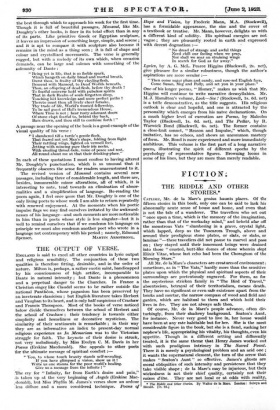POETS AND POETRY.
AN EPIC POET.*
A FIRST encounter with the poetry of Mr. Charles Doughty is apt to call into action a sin that besets even the worthiest critic, for he who approaches that poetry finds himself confronted. by an English which (however perfectly Mr. Doughty may have identified himself with it) is not the language of to-day or yesterday. It is a language which is certainly not later than Spenser and owes much to Chaucer. Mr. Doughty openly claims those two great poets as his masters, and linguistically at least lie is of their company. To most people Mr. Doughty appears at first difficult and bewildering, or, if not difficult, strained and artificial, and alienated by this the critic is inclined to take refuge in the discussion of an abstract principle. Is a writer justified, he asks, in assuming an archaistic style ?
Such a method of criticism is always extremely dangerous. Attempts have been made to establish principles and standards from which to approach the criticism of literature and art, but so far with results almost wholly negative. The keys are seldom found to fit : the attempt to make a work of art conform to pre-ordained standards almost invariably ends in the reversal of the process, namely, in the modification of the standards so that they shall conform with the recalcitrant work of art. Any discussion of Mr. Doughty's case involves, besides, the question how far his poetic style is deliberately assumed. He has soaked himself in Chaucer and Spenser and the old writers, and has, I understand, largely or entirely ignored modern literature. Is it not possible, then, that his style is a perfectly natural growth, as native and genuine as that of any other conscientious striver after self-expression ? Assuming this to be so, we find that our question in its present form has been thrown out of gear, and the fact that we cannot, without application to the writer himself, ever solve, it, rouses a strong suspicion of its justifiability on artistic grounds. The question, in fact, has nothing whatever to do with the finished work of art. And all such questions, it seems to me, end in a cul-de-sac, and drive us back, on the only, justifiable method—judgment by results. Let the lover of fine literature, then, put his principles and standards in his pocket, and read The Dawn in Britain, The Titans, Mansoul and the other poems. But he must read all of each : he is no more justified in judging them from the inspection of a few passages than he would be in judging, for instance, Mr. Augustus John's Sym- phonic Espagnole by a studious consideration of a few square inches isolated here and there from the total area. We are willing to take some trouble for Chaucer or Dante ; why not, then, do as much for Mr. Doughty, especially when we have a warrant of his greatness as an artist in the general admission that his Travels in Arabia Deserta is a prose work of the first rank—the greatest book, in the opinion of many weighty persons, of our time ?
My own view of The Dawn in Britain is that it is one of the great poems of our language, and that in Mr. Doughty's verse, as a whole, we have a mass of beautiful poetry, the compara- tive neglect of which is a lamentable thing.
Mansoul, the poem of which a revised version has recently been published in a beautiful edition by Mr. Jonathan Cape and The Medici Society, is the latest of Mr. Doughty's books, for it first appeared in 1920. It is also the melloWest, and linguistically the least strange of all his poems, and therefore • man,our. By C. 3E. Doughty. Limited Edition. London : Jonathan Cape end The Medici Society. [21a. net.) the best through which to approach his work for the first time. Though it is full of beautiful passages, Mansoul, like Mr.
Doughty's other books, is finer in its total effect than in any of its parts. Like primitive Greek or Egyptian sculpture, it leaves an impression of something large, simple, and serene ; and it is apt to compare it with sculpture also because it remains in the mind as a thing seen ; it is full of shape and colour and crystallized movements. The verse is generally rugged, but with a melody of its own which, when occasion demands, can be large and solemn with something of the solemnity of Dante : "Being yet in life, that is so feeble spark, Which hangeth on daily bread and mortal breath, Durst thou, in frailty of thy clayling flesh, Descend with Mansoul, to Dead Worlds beneath, Thou, an offspring of dead flesh, before thy death ? To fearful converse hold with pulseless spirits That in dark Realm of souls forgotten sleep, Touching hid knowledge and more perfect paths ? Thereto must thou all lively cheer forsake, Thy trade of life, World's wonted fellowship, To be sad guest of Hers tremendous House, Where Time is not • hear rusty adamant doors Of stone clapt fearful to, behind thy back, Bars drawn, and thou still to continue forth ! "
A passage near the opening of the book is a good example of the visual quality of his verse : I slumbered till a turtle's gentle flock,
That feared not yet Man's shape, folding from flight Their rattling wings, lighted on vermeil feet, Jetting with mincing pace their iris necks, With crooling throat-bole, voice of peace and rest, All round about me at that their drinking-place."
In each of these quotations I must confess to having altered Mr. Doughty's punctuation, which is so unusual that it
frequently obscures the sense for readers unaccustomed to it. The revised version of Mansoul contains several new
passages, including three of considerable length, and there are, besides, innumerable minor alterations, all of which, it is interesting to note, tend towards an elimination of abnor- malities and a simplification of language. Re-reading the poem again, I feel once more that Mr. Doughty is one of the only living poets to whose work I am able to return repeatedly with renewed enjoyment. At the moments when his poetic impulse flags we may find ourselves irritated by the awkward- nesses of his language—and such moments are more noticeable in him than in poets whose style is less singular—but it is well to remind ourselves that if we condemn his language on principle we must also condemn another poet who wrote in a language not contemporary with his period ; namely, Edmund











































 Previous page
Previous page